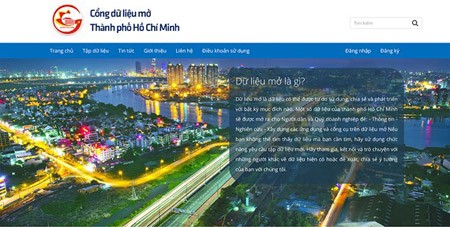
The existing e-government in HCMC is still quite incoherent and lacks interoperability. Thanks to Instruction No.16, HCMC can become more active in forming a new and more advantageous government model – the digital government – in order to better operate and manage the to-be smart HCMC in the near future.
Currently, the project ‘Transforming HCMC into a smart city’ has 4 major goals of building a shared database and developing an open database ecosystem, constructing an operating center for a smart city, creating a center to predict and simulate the economy – society, forming an information security center.
In order to have a closely linked administration system where IT applications are coherent, the municipal authorities has approved the architecture of an electronic government that can be further transformed into a digital government.
This e-government is supposed to be the basis for other IT applications of state offices in different levels, making them more synchronous and united.
This architecture can also ensure that all investment plans of the local state management on IT and communications reach their fullest potential, meet citizens’ demands, and avoid financial waste or repetition.
Obviously, the construction of an e-government and a smart city is the foundation for HCMC to fulfill Instruction No.16 above, via the re-organization of the database to form the digital infrastructure.
The initial step in this long-term construction is to create a data architecture model for the to-be shared database, one of the 4 major goals of the mentioned project. This database will be the place to provide necessary data for other applications of state offices, including the common data for state administration, various directories, and common resources.
The first group – the common data for state administration – will become the core of this database, allowing the formation of big data through the connection of smaller ones and the unitedly linked applications in the system.
In the plan for a shared database and open database ecosystem of HCMC, the three most focused components are ‘citizens’, ‘businesses’, ‘parcel of land’ (in accordance with cadastral maps).
Regarding ‘citizens’, the most important factor in the society, each office of the municipal authorities is now managed one specific aspect. For example, the HCMC Department of Justice takes control of registering a birth, a death, or a marriage; the HCMC Police Department administrates residence and ID card issuing; the HCMC Department of Education and Training manages education status; and the HCMC Department of Health is in charge of residents’ healthcare. All these pieces of information compose a digital version of a citizen.
However, right now, each piece is stored in one particular application of the corresponding department, and thus there is no comprehensive view for easy access.
The to-be shared database is expected to collect basic data of citizens (consisting of ID number, full name, birthday, birthplace, nationality, ethnic) and store them in one place for all applications to access. Other specific information such as criminal record, healthcare history, educational status, or insurance policy is still managed by the corresponding offices.
The benefit of this new united system is that managers can easily approach the most comprehensive digital version of any citizen via the linked data. What is more, this version can be enriched gradually thanks to new status collected by IoT (Internet of Things) equipment. This is the most basic purpose of a digital government.
Obviously, the appearance of linked data for a ‘citizen’ in the common database ensures a close connection among arisen data from IoT devices or specific applications and existing ones, regardless of departments (whether it is education, healthcare, or police).
Based on this shared database, HCMC is going to develop an open data portal at the address https://data.hochiminhcity.
Besides this impressive use, the public database is a way to mobilize power of the business community to help IT companies, especially innovative startups, to develop digital services for citizens, businesses, and administrative organizations, greatly contributing to the growth of an innovative startup ecosystem as well as the digital economy of the city.
Needless to say, data will become a new resource to build and develop the digital government and economy. In a long term, they can be the foundation for the digitalization of administrative work and aid residents in monitoring the effectiveness of state officers while being able to manage suggestions from citizens.
HCMC is simultaneously and synchronously launching various projects based on information technology like building a smart city, bringing the e-government architecture into reality, forming a shared database and open database ecosystem. All can be done thanks to the well-communicated viewpoint on the digitization process.
























